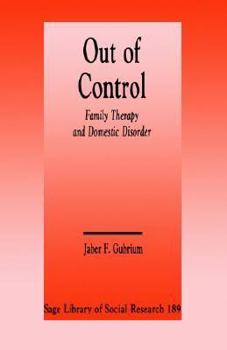Out of Control: Family Therapy and Domestic Disorder
Select Format
Select Condition 
Book Overview
In a unique comparative ethnography of two family therapy programs, Gubrium deftly shows how differing organizational perceptions make visible the social construction of domestic disorder. Contrasting images of home life--one viewing domestic order as a system of authority, the other as a configuration of emotional bonds--serve to highlight different senses of the family as being out of control and to recommend alternate forms of intervention. The...
Format:Paperback
Language:English
ISBN:0803946333
ISBN13:9780803946330
Release Date:March 1992
Publisher:Sage Publications, Inc
Length:257 Pages
Weight:0.77 lbs.
Dimensions:0.7" x 5.6" x 8.5"
Customer Reviews
0 rating





